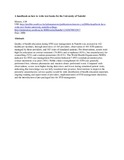| dc.description.abstract | Quality of health education during STD case management in Nairobi was assessed in 142 healthcare facilities, through interviews of 165 providers, observation of 441 STD patients managed by these providers, and 165 visits of simulated patients. For observations, scores were high for education on contact treatment (74-80%) and compliance (83%), but unsatisfactory for counselling (52%) and condom promotion (20-41%). The World Health Organization (WHO) indicator for STD case management Prevention Indicator 7 (PI7) (condom promotion plus contact treatment) was poor (38%). Public clinics strengthened for STD care generally performed best, whereas pharmacies and mission clinics performed worst. Compared with observations, scores were higher during interviews and lower during simulated patient visits, indicating that knowledge was not fully translated into practice. Interventions to improve the presently unsatisfactory service quality would be wide distribution of health education materials, ongoing training and supervision of providers, implementation of STD management checklists, and the introduction of pre-packaged kits for STD management. | en |

